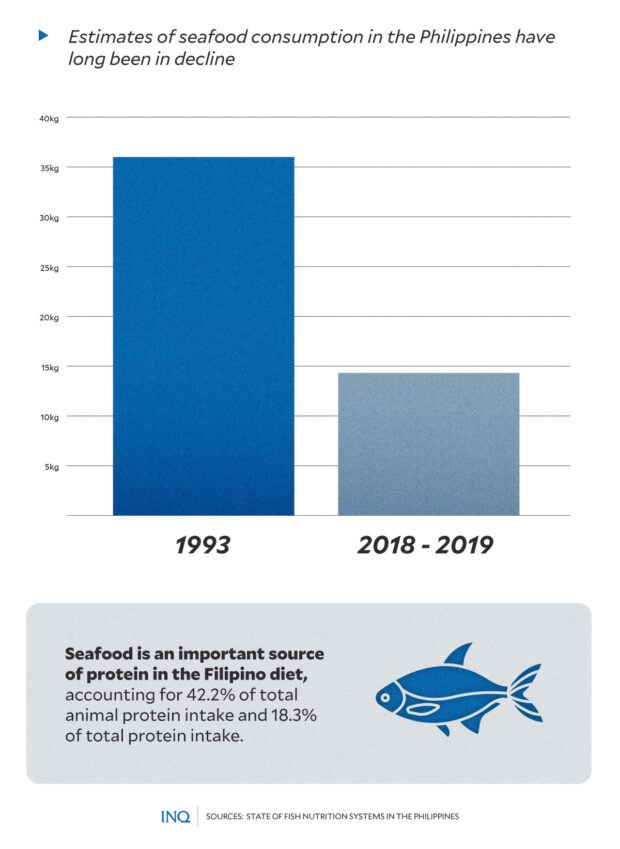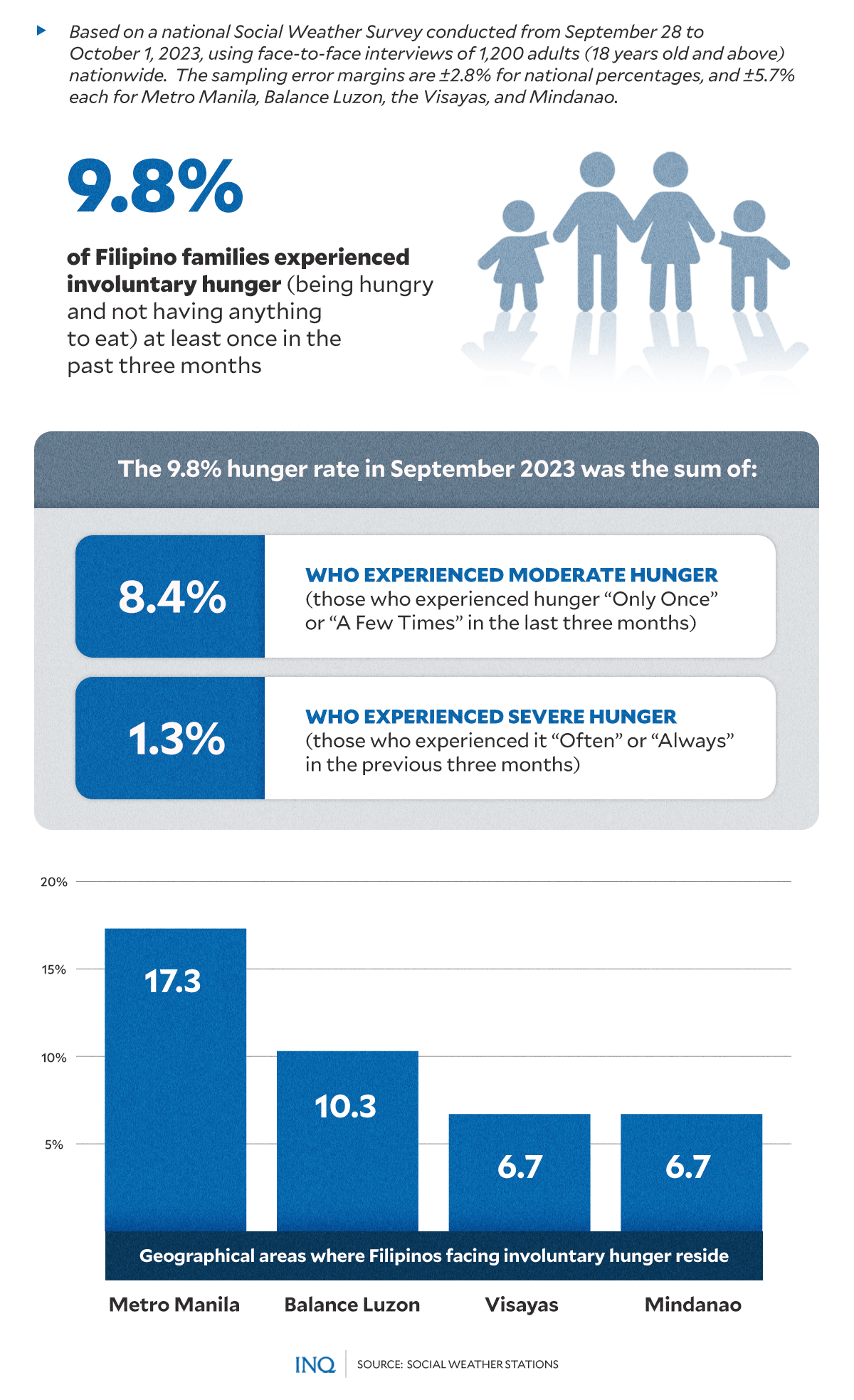Oceana: Restore fisheries abundance to fight hunger, poverty in PH
MANILA, Philippines—Faced with the alarming decline of fish populations due to overfishing and habitat destruction, the Philippines grapples with the challenge of sustaining its people who depend heavily on the ocean for nutrition and livelihood.
A survey by Social Weather Stations (SWS) released last month showed that around 9.8 percent of Filipino families have experienced involuntary hunger at least once in the last three months.
The involuntary hunger rate refers to the percentage of Filipino families who experienced hunger or those who did not have anything to eat at least once in the past three months.
According to SWS, the 9.8 percent hunger rate in September 2023 was the sum of 8.4 percent who experienced Moderate Hunger and 1.3 percent who experienced Severe Hunger.
“Moderate Hunger refers to those who experienced hunger ‘Only Once’ or ‘A Few Times’ in the last three months. Severe Hunger refers to those who experienced it ‘Often’ or ‘Always’ in the previous three months,” SWS explained.
Article continues after this advertisementFamilies who experienced hunger were highest in Metro Manila at 17.3 percent, followed by Balance Luzon (or Luzon outside Metro Manila) at 10.3 percent, the Visayas at 6.7 percent, and Mindanao at 6.7 percent.
Article continues after this advertisementREAD: Hunger in Filipino families slightly falls in 3rd quarter of 2023 – SWS
In a statement, Oceana, an international ocean protection and conservation group, noted that the country’s fisheries could “very well feed” the people and that no Filipino should go hungry.
“The Philippines ranks second in the world in terms of population who are highly dependent on healthy and vibrant oceans for nutrition, livelihood, and coastal protection,” Oceana said.
However, the group stressed that the country’s oceans and rich biodiversity continue to be threatened by human-induced pressures such as rampant overfishing and the destruction of marine habitats. These damaging activities cause an alarming decline in the fish population.
“Filipinos are highly dependent on the consumption of seafood aside from rice and vegetables. Seafood is an inexpensive and accessible source of animal protein, rich in critical micronutrients, such as iron, zinc, vitamin A, and omega-3 fatty acids that should address stunted growth, malnutrition, and other ailments that are otherwise preventable,” said lawyer Gloria Estenzo Ramos, Oceana vice president.
“We call on the government to seriously work on the restoration of our fisheries abundance to significantly reduce the incidences of hunger and health challenges, especially among the poor,” she added.
Data from the Department of Science and Technology-Food and Nutrition Institute (DOST-FNRI) published in the State of Fish in Nutrition Systems (FINS) in the Philippines study showed that the estimated seafood consumption of Filipinos has long been in decline in the past decades.
The study noted that a “substantial decline in seafood consumption” was recorded — from 36 kg per capita rate in 1993 to 14.32 kg of average annual edible portion weight of seafood consumed per individual from 2018 to 2019.
It also found that individuals in the Cordillera Administrative Region (CAR) and the National Capital Region (NCR) consumed the least fresh fish per day. In contrast, those in the Zamboanga Peninsula (Region IX) consumed the greatest amount of fresh fish per day.

GRAPHIC Ed Lustan
Among the issues revealed in the study was the undervaluation of coral reefs’ significant role in providing food and livelihood security.
Aside from offering 50 times more employment opportunities than commercial fishing in Exclusive Economic Zones, these reefs also play a crucial role in supporting the developmental stages of various fish species, such as groupers (lapulapu), snappers (mayamaya), rabbitfish (danggit), sardines, and round scad (galunggong).
The study likewise noted that seafood gleaned from intertidal zones, like sea cucumbers and shells, is a steady source of essential nutrients for Filipinos but is underappreciated.
It further highlighted the unreported catch of commercial fishing that contributes to the underestimation of fish and seafood supply.
According to Ramos, the findings in the FINS study “should fire us up to restore the once-deep seated relationship that we had with our ocean and make it the wellspring of health, livelihoods and well-being of our people.”
“We laud some of our local government champions who have set the standards high for nutrition, wellness, and ecological integrity as priority programs for their constituents,” Ramos said.
Oceana works with fisherfolk, other civil society groups, academe, and local and national government agencies in developing and implementing the National Sardines Management Plan through the 12 Fisheries Management Areas in the country.
Aside from sardines, other fish and seafood are managed, and the marine habitats and other ecosystems that contribute to fisheries production are protected.
“With the findings in the FINS study, we are venturing into partnerships with local government and national government agencies, hand-in-hand with fisherfolk, in developing plans and programs to effectively bring nutritious fish and seafood [to] the table of households, particularly in coastal communities,” Ramos said.
“Let us be better stewards of our ocean and enhance the well-being of the present and the future generations,” she added.
RELATED STORIES:
Oceana lauds single-use plastic ban in Tubbataha Reefs Natural Park
Vessel monitoring, key to fight vs plunder of PH seas, faces new problem

